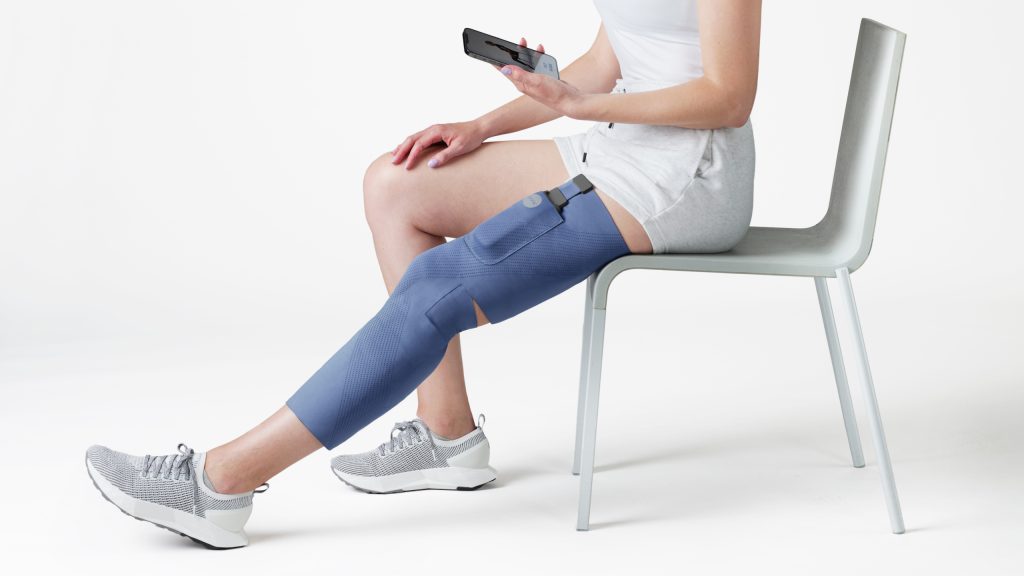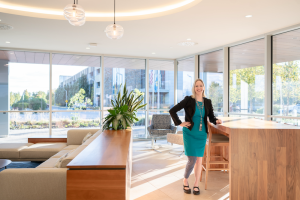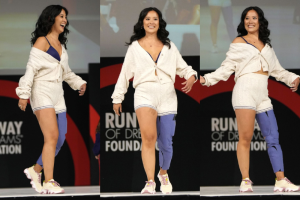Meet Blanca. She is a disability advocate with a passion for adaptive fashion. She was first diagnosed with MS in 2018. In 2019, she suffered paralysis in her left leg, and her world was turned upside down. Here is her story.
Navigating the unknown in the early days of her diagnosis
At the time of her diagnosis and declining mobility, Blanca was just 30 years old. Like many young people who receive a chronic illness diagnosis, she recalls feeling overwhelmed, scared, and alone.
Soon after receiving her diagnosis, she started on medication. And despite daily intravenous injections, chronic pain became a constant companion. In an effort to stay mobile, she also completed multiple rounds of physical therapy. But despite taking a proactive approach to her treatment and mobility, her ability to walk long distances was declining. It was soon clear she would need walking assistance.
Learning to embrace mobility aids

Although Blanca knew mobility aids could keep her independent, she avoided using them early on. She didn’t want to draw attention to her disability, even if it meant more pain and an increased risk of falling.
In 2019, a year after receiving her diagnosis, she bought her first wheelchair. At the time, she couldn’t walk more than 200ft. “I hated using it. The stares and comments were constant.”
She soon realized MS wasn’t her biggest obstacle; it was accepting her disability and not feeling ashamed of her declining mobility or need for assistive devices.
“I spent a lot of days trying to figure out in my head what to do—how to come out in a way and show everyone that I’m not—and I shouldn’t be—ashamed of who I am.”
Eventually, she shared her diagnosis with the world and began trying other devices to help improve her walking ability, including an AFO, the Bioness L300, and the Cionic Neural Sleeve.
The Bioness L300 helped with her foot drop, which in turn helped her increase her walking distance to nearly 2,000 steps. More recently, she introduced the Cionic Neural Sleeve into her toolkit of devices.
“I remember the first day I really used it to walk. I went to Home Depot with my dogs and with my husband. That day was great because I was able to do a lot of things. It made me feel like I had something that was really helping with my walking.”
In addition to improving her walking, Blanca says the Neural Sleeve also helps reduce the cognitive load she previously experienced while walking. She doesn’t have to think about where she’s stepping—how she’s moving her foot. “When I’m wearing the sleeve, I don’t really have to think. It just happens. I just walk easier.”
She also uses the sleeve when going out and about. She can walk longer distances, allowing her to go out to eat and navigate unfamiliar places more confidently.
Journey with self-love and finding her passion for adaptive fashion

Blanca says her journey with self-love hasn’t been linear. Even after moving past the initial shame and embarrassment she felt around her diagnosis and declining mobility, she still struggled at times to feel pretty and to feel proud of herself—to truly embrace self-love and self-compassion.
“One of my biggest insecurities was using a cane that didn’t match my personality.” After doing some initial research, she found Fashionable Canes, which sparked an initial interest in finding ways to style her assistive devices.
Fast forward to today, and Blanca has found a passion for adaptive fashion, which has been a big part of finding herself and embracing disability pride.
“Who says being sick or disabled means sacrificing style? I want to feel pretty, but I also want to be comfortable in my clothes and while using my mobility aids.”
Since first discovering Fashionable Canes, she has purchased multiple canes in different colors and loves matching her Neural Sleeve with her outfit. In doing so, it’s helped her embrace her unique journey, feel more like herself, and truly embrace self-love, despite the challenges that come with living with MS.
Blanca recently shared more on adaptive fashion and how she styles the Neural Sleeve on the CIONIC blog. Read about it here!
Sharing her story and advocating for children with disabilities
In addition to sharing her story more broadly, Blanca also hopes to not only help people her age who are struggling to navigate the world with disabilities but also children. “There are a lot of children out there who have disabilities and they’re being bullied. I want to help show them there is nothing to be ashamed of. This is just something that happened to us.”
Thank you, Blanca, for sharing your story and being an advocate for the disability community.
About CIONIC:
CIONIC is a bionic clothing company on a mission to superpower mobility for individuals with disabilities. The Cionic Neural Sleeve is an FDA-cleared clothing garment indicated to:
- Improve walking
- Increase strength and range of motion
- Facilitate muscle re-education
It is indicated for individuals with upper motor neuron disorders, including multiple sclerosis, stroke, cerebral palsy, incomplete spinal cord injuries, traumatic brain injuries, and more. Take the assessment to see if it’s a fit for you.

Individual results may vary, and the Neural Sleeve is designed to improve gait and strength for individuals with upper motor neuron diagnoses. Consult your doctor on medical decisions.





